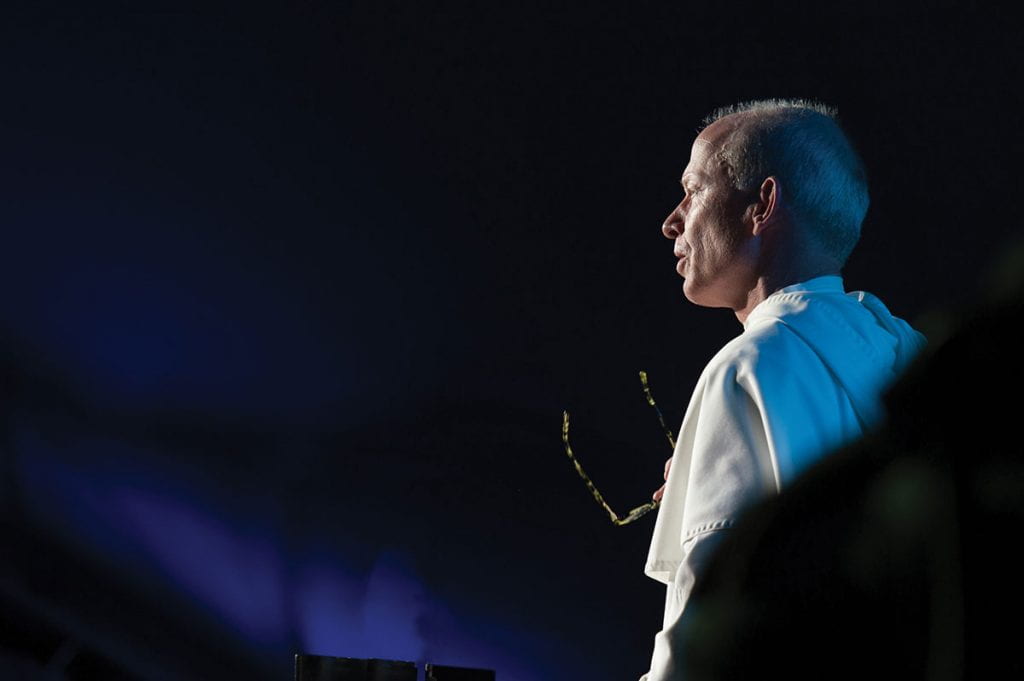A hidden strength
By Rev. Joseph J. Guido, O.P.
The early photos were of him working out in Peterson or striding confidently across the plaza in front of St. Dominic Chapel. Still youthful looking and beaming with a sense of wonder that it was true — that he, Brian Shanley, was president of Providence College — he was the epitome of the local boy made good and of the ascendancy of a new generation of Dominicans.
Everyone agreed that his Inaugural Address was brilliant. The product of a formidable intellect and a deep immersion in the thought of Aristotle and Aquinas, it challenged prevailing opinion and asserted that the liberal arts, and the Catholic and Dominican tradition, had something critically important to contribute to our time and should be at the heart of the education we provide our students. The impression it left was unmistakable.
Change was afoot — change that inspired hope for the future of Providence College, change that was bold and vigorous and that promised to unite the College in a common and noble purpose.
Time would take its toll as it inevitably does. He made the hard decisions — on finances, personnel, race, and gender — and plunged deep into curricular reform and the revision of the mission statement. Controversy ensued, as he knew it would, and not everyone agreed with him. Some cast themselves in permanent and vocal opposition. It stung. How could it not? Beneath the hardened exterior he was a man like any other, more sensitive than appearances betrayed and more tenderhearted than many would suspect.
But he remained undaunted. His will was strong, sometimes to the point of stubbornness. Exhausted, he could seem abrasive. He made mistakes. Yet he lent himself, gave himself completely to the task and to the College, his stamina astonishing and his success undeniable. A campus literally transformed, the endowment greatly enlarged, the faculty renewed, and an ever more talented and diverse student body. An extraordinary accomplishment by any measure, and one for which we owe him a depth of gratitude.
None of this, however, will prove to be his most important legacy. That will be owed to his faith and to his prayer.

The last two years have visibly aged him, and for good reason. In the early morning, bracing himself during Lauds in the priory chapel, he gave a hint of the bad hip that hitched his gait and caused him pain. He is thinner now, having undergone emergency surgery. And his face is drawn, the likely effect of a bruising battle about a possible fourth term as president.
Then there are his eyes, shadowed by sadness. No trial has tested him more than the death of his brother, Paul. Twinned in the womb, they were inseparable, lifelong best friends, competitive in sports and loyal in every other way. Through diagnosis, surgery, chemotherapy, and remission, and in the last days at home, he was by his side. Meals shared, jokes told, confidences entrusted, all drawn into the fathomless mystery of the Eucharist they celebrated together in church, at home, by bedside.
A winnowing fire, this, a dark night of the soul, a sifting of the wheat and chaff; unbidden purification accepted, not easily, but with faith. For faithful he has been, day after day, to the work, to the life avowed, and to prayer.
In a homily he gave not long ago he alluded to these trials and quoting the writer Anne Lamott, to that most basic of prayers, “Help.” It is a prayer that he has learned to say, over and over again, and perhaps at times the only prayer he could say. A prayer that says everything necessary to say about the human condition, our need, and everything necessary to believe about God, his beneficence.
Few of us share his brilliance or strength of will, his drive and energy, and few of our lives will be measured by accomplishments as great and significant as his. But we all share a common plight, and never more so than at present. Stalked by a virus, and prone to anxiety as we face an uncertain future, we are reminded of our fragility and how tenuous our grasp is on health and even life itself. “Help”, indeed.
Yet it was in his moment of greatest weakness that Brian Shanley taught us — silently, and all but hidden from view — how to find the surest source of strength, the one we need now in our time of need, and for that we owe him our deepest gratitude, and our prayers.
Father Guido is an assistant professor of psychology and senior staff psychologist in the Personal Counseling Center.





